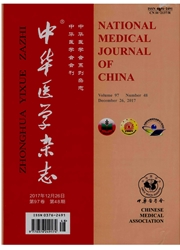

 中文摘要:
中文摘要:
目的研究夏枯草对淋巴瘤细胞生长的影响及其可能的机制。方法参考临床常用剂量,采用50g/L夏枯草(夏枯草组)、50g/L夏枯草及20umot/L.c—Jun氨基末端激酶(JNK)特异抑制剂SP600125(SP600125组)处理Raji细胞,以加入同体积生理盐水处理的Raji细胞作对照,应用噻唑蓝比色法(M丌法)检测各处理方式下细胞增殖率,通过Western印迹检测JNK、c—Jun磷酸化水平和半胱氨酰天门冬氨酸(Caspase-3)的表达,流式细胞术(FCM)检测细胞凋亡率。结果夏枯草细胞增殖率(67.32±1.96)%低于其余各组(P〈0.05);JNK磷酸化水平(0.48±0.03)和c-Jun磷酸化水平(0.46±0.04)在夏枯草组均明显增高(P〈0.05),SP600125可抑制c—Jun磷酸化(0.43±0.01);夏枯草组的Caspase-3表达(1.35±0.07)高于其他各组,SP600125使其表达减少(0.79±0.06,P〈0.05);细胞凋亡率在夏枯草组中最高(25.32±5.27)%(P〈0.05)。结论夏枯草可以明显抑制Raji细胞的生长,这种抑制作用可能是通过激活JNK信号转导通路和Caspase途径导致细胞凋亡实现的。
 英文摘要:
英文摘要:
Objective To characterize the effect of Prunella vulgaris upon lymphoma cells and its possible mechanisms. Methods Raji cells were subjected to different therapeutic schemes: Prunella vulgaris (50 g/L) group, P. vulgaris (50 g/L) + SP600125 (20 umol/L, JNK inhibitor) (SP600125 group) ; Raji cells in physiological saline served as the control. MTF assay was used to measure the cellular proliferation. Phosphorylation of JNK, c-Jun and the expressions of Caspase-3 were determined by Western blot. Cell apoptosis was analyzed by FCM. Results The prnliferation rate of cells in the P. vulgaris group (67.32± 1.96) % was significantly lower than that in the other groups ( P 〈 0. 05 ). The phosphorylation of JNK (0. 48 ± 0. 03 ) and the phosphorylation of c-Jun (0.46± 0. 04) significantly increased in the P. vulgaris group (P 〈 0. 05 ) and SP600125 inhibited the phosphorylation of c-Jun (0. 43 ± 0. 01 ). The expression of Caspase-3 in the P. vulgaris group ( 1.35 ± 0. 07) was higher than that in the other groups. And such an effect could be blocked by SP600125 (0.79 +-0.06) (P 〈0.05). The rate of cellular apoptosis was the highest in the P. vulgaris group (25.32 ± 5.27 ) % ( P 〈 0. 05 ). Conclusion P. vulgaris shows a strong inhibitory effect upon the growth of lymphoma cell line Raji probably through the activation of JNK pathway and caspase channel and then apoptosis.
 同期刊论文项目
同期刊论文项目
 同项目期刊论文
同项目期刊论文
 期刊信息
期刊信息
